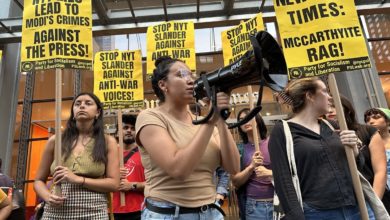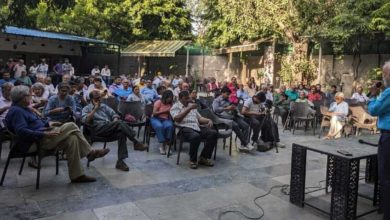Photo: Lula celebrates with a massive crowd of supporters on election night. Credit: @ptbrasil/Ricardo Stuckert
Celebrations erupted in the streets of Brazil as former president Luís Inácio Lula da Silva was declared the winner of Sunday’s presidential run-off election, an inflection point for politics in the country and in Latin America. This is a deeply emotional victory for Brazil’s working class after four years under the presidency of Jair Bolsonaro marked by intense suffering but also fierce class struggle.
The political direction of the country has regional and global ramifications. Brazil is the largest country in Latin America with a population of 215 million and sharing a border with all but two South American states. It is a core member of the BRICS economic bloc and the 12th largest world economy based on nominal GDP. Under Bolsonaro, solidarity with Latin America’s left-leaning countries gave way to hostility as Bolsonaro unabashedly sought to build ties with Trump. The return of Lula to the presidency has the potential to help end the isolation of neighboring nations such as Cuba and Venezuela, severely impacted by devastating U.S. policies and sanctions. During Lula’s first administration, Brazil was part of the imperialist-led military intervention in Haiti, a mistake that many activists hope will not be repeated as a similar situation takes shape today.
Lula’s victory is, above all, a victory for Brazilian democracy. The country returned to direct presidential elections in 1989, following the end of the brutal military dictatorship that ruled from 1964 to 1985. Lula would run four times before winning in 2002 — the first of four consecutive presidential election victories for the Workers Party. Brazil’s brief democratic streak was abruptly aborted in 2016 with a parliamentary coup against President Dilma Rousseff. The political persecution of the Workers Party would culminate with Lula’s imprisonment in April 2018, paving the way for Bolsonaro’s electoral victory in October of the same year.
From prisoner to president
“I consider myself a citizen who was politically resurrected … they tried to bury me alive,” stated Lula after election results were announced.
Only four years ago Lula sat in a cell, the outcome of a political operation masquerading as an anti-corruption campaign known as Operation Car Wash. Sérgio Moro, the judge who personified the liquidation campaign against the Workers Party, was elevated to the status of national hero, his brazen violations of the law held beyond reproach by the conservative Brazilian media and a political establishment intent on ending the Workers Party as a viable force in Brazilian national politics. They found a militant base of support in a rising extreme-right movement with openly fascist inclinations. Bolsonaro’s ascension to the presidency became the electoral reflection of this sharp turn to the right.
It would be hard to imagine that following such a devastating string of setbacks for Brazil’s left, Lula would now return to the presidency. How was this turn of events possible?
The role of popular movements and organized labor cannot be overstated. Critical revelations came to light exposing how Judge Moro colluded with prosecutors to ensure Lula would be convicted despite a complete lack of evidence — but if facts alone could force the hand of the country’s elites, Lula would have never been imprisoned to begin with.
Committed activists maintained a permanent encampment outside the federal facility where Lula was held for all 580 days he spent behind bars, loudly greeting him three times a day. Mass organizations and labor unions embraced and promoted the Free Lula campaign, rallying the support of artists, intellectuals, and world leaders to build it into an international movement that laid bare Brazil’s political witch hunt for the world to see. Looking to salvage the credibility of the country’s institutions, Brazil’s Supreme Federal Tribunal — the country’s highest court — annulled the rulings against Lula and set him free. Many of these same movements played a leading role in Lula’s now-victorious presidential campaign through committed mobilization and grassroots organizing.
Credit must also be given to Bolsonaro himself for his own defeat. His policies have been disastrous for the people of Brazil. Hunger became once again widespread with 58.7% of the population experiencing some degree of food insecurity as of June 2022. Violence in the countryside intensified as policies protecting landless workers, Indigenous peoples and the environment were undone. Bolsonaro’s response to the COVID-19 pandemic delayed purchase of vaccines, led to the spread of misinformation about their efficacy and denied basic protections to workers, which greatly contributed to the nearly 700,000 COVID deaths registered in the country. His 2018 anti-corruption campaign rhetoric was followed by four years of corruption scandals from overpriced vaccine purchases to a “secret budget” skirting around public accountability for federal funds allocated to legislative districts designed to secure congressional support for his government.
The critical weeks between the first and second round of elections saw a string of explosive events, both figurative and literally, involving high-level political allies of Bolsonaro. Following an order converting his house arrest into regular incarceration, former congressional representative Roberto Jefferson responded to federal police by firing more than 50 rounds with a rifle and throwing three hand grenades. Indications emerged suggesting that Tarcísio de Freitas, running for governor of São Paulo, may have staged a shoot-out during his visit to the community of Paraisópolis that ended with the death of a local resident. The day before elections, congressional representative Carla Zambelli was filmed gun in hand chasing a Black man in the streets over a verbal argument.
While retaining a strong core of rabid ideological supporters, his electoral base eroded around the edges, with several electoral districts where Bolsonaro won in both 2018 and 2022 registering lower support for his campaign this time around. This was the first time that a sitting president was not re-elected since 1997, when the law was changed to allow the incumbent to run for a second term.
Important sectors of the Brazilian ruling class are now longing for some degree of political stability that Bolsonaro cannot deliver. Labeled the “Brazilian Trump,” Bolsonaro became a source of embarrassment on the international stage, and the turmoil and scandals of his government have taken a toll.
Mainstream media coverage and pronouncements by election officials leading up to the vote sought to dispel misinformation spread by Bolsonaro operatives and supporters over the country’s electronic voting machines. On election night, the president of Brazil’s Supreme Federal Tribunal and the Superior Electoral Tribunal made statements supporting the integrity of the electoral process. The presidents of the national Senate and the House of Representatives echoed this message, congratulating Lula on his victory and calling for results to be respected. Globo, the country’s largest television network with a long history of fierce opposition to the Workers Party, struck a similar tone in its coverage.
Let there be no mistake: these pronouncements spring not from a principled stand for democratic rights, but from an instinct of self-preservation of Brazilian elites weary of political chaos. Many of these same voices were mouthpieces for the 2016 coup and the 2018 legal offensive that put Lula in jail. They may be willing to part ways with Bolsonaro the president, but will fight tooth and nail to prevent the rollback of key policies implemented by Bolsonaro under a new Lula government.
What the election results say about the road ahead
Lula captured 50.9 percent of valid votes against 49.1 percent for Bolsonaro — a thin spread amounting to some 2 million votes, the tightest presidential election outcome since the return to democratic elections in 1989.
Election results are not a precise measure of the political split in the country. Pre-election polls consistently suggested a wider gap between candidates, but an abstention rate of 20.59% on election day may have boosted Bolsonaro as the poorest sectors of the population invariably face greater challenges in casting their vote. Highway police openly disobeyed orders from Brazil’s Superior Electoral Tribunal to not impede voter transportation to the polls, executing at least 560 “inspection operations” stopping buses carrying voters and disproportionately targeting Lula’s stronghold in the northeast with 272 such actions. A petition from the Workers Party to extend voting hours to compensate for the resulting transportation delays was denied.
But it must also be recognized that there are elements of the Workers Party’s previous period in power that may have dampened enthusiasm. The party’s approach in government was to balance the interests of workers and capitalists, securing major new social programs while leaving the fundamentals of the capitalist system untouched. This was the basic premise of Lula’s landmark “letter to the Brazilian people” published in 2002 to reassure markets and the IMF that his victory would not imperil the core interests of big business. This led the Workers Party to take actions that weakened its own standing at critical moments, like the austerity budgets supported by Lula’s successor Rousseff or the decision to welcome right-wing politician Michel Temer onto the 2014 ticket as her vice president. Temer would go on to play a key role in the parliamentary coup against Rousseff and take over the presidency.
For an extended period of time, the Workers Party administrations were able to keep up this balancing act thanks to a major economic boom Brazil experienced during the first decade of the century. Fueled especially by historically high commodity prices, Brazil emerged as a major player in the world economy, recognized as such with its membership in the BRICS grouping. But pursuing a developmentalist economic policy with a capitalist state operating in a world economy dominated by the imperialist countries has its limits, and the rapid growth that secured the acquiescence of much of the country’s capitalist class dried up.
It is undeniable that Brazil remains highly polarized with divisions which will pose real challenges for the left. It is clear that the extreme-right movement behind Bolsonaro remains a force within Brazilian politics and society. Hundreds of roads across nearly all of Brazil’s states were shut down by pro-Bolsonaro truckers in the aftermath of the vote to reject the election results. Additionally, Bolsonaro’s party has secured the largest number of seats in both chambers of Congress with right-wing parties in general increasing their seat counts. It will be no easy feat to build support for the government in Congress, where in addition to the opposition the government must contend with a significant bloc of career politicians with no ideological loyalties who engage in “pay-to-play” politics in order to throw their weight behind government priorities.
Lula’s campaign pursued a broad united front for democracy and against fascism to defeat Bolsonaro, bringing together a heterogeneous constellation of forces including several of the party’s historic opponents. Now that the electoral victory has been secured, their divergent class loyalties and ideological positions are bound to come to the fore.
In his first two presidential terms, Lula benefitted from an extended period of capitalist growth that made the country’s elites more amenable to concessions and compromises in the form of social programs. His new government will now face fierce resistance from a capitalist class unwilling to bear the cost of the severe economic crisis that has now reached global proportions.
Lula’s historic comeback and the defeat of Bolsonaro are filled with potential, but it cannot be realized by the efforts of the government alone. The reconfigured balance of forces emerging from the elections is not yet decisively in favor of the left. Advancing a truly progressive agenda will require the activism and vigilance of popular movements, labor unions and working-class organizations. They remain the most important factor in the struggle against the extreme right and in tilting the scales in favor of Brazil’s vast working class.






